【Presented in COP26】Cleaning up the waters of Nicaragua's large lakes! The "BIWAKO Task Force Group" is very active and uses Japan's "Lake Biwa" as a model
2021.11.24
Lake Managua, located in the capital city of Nicaragua in Central America, is a massive lake with an area almost twice that of Lake Biwa. To the north of the lake rises the Momotombo volcano, which is said to be the symbol of Nicaragua, and from the shore of the lake, one can enjoy a magnificent view. However, the water has been polluted by an influx of agricultural, industrial, and domestic wastewater, and the shore is littered with garbage. In recent years, projects have been implemented to improve the quality of the water, whereas previously, the people of the area looked away from the filth and stayed away from the lake.
In an effort to coexist with Lake Managua, JICA Nicaragua Office has launched an initiative to significantly improve the lake’s water quality. The name of the project is "BIWAKO Task Force Group."
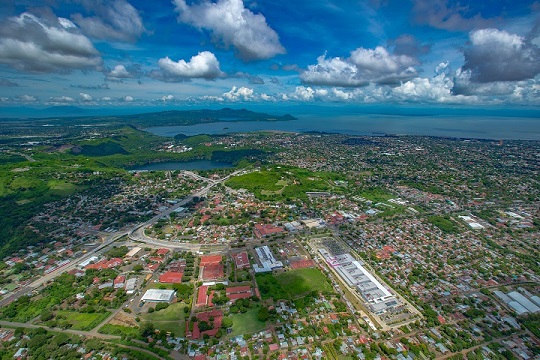

(Above) The vast Lake Managua, stretching 65 km from north to south and 25 km from east to west and is located next to the capital city of Managua, is also known as "Lake Xolotlán," a name of indigenous origin (Photo: Mayor's Office of Managua)
(Left) Plastic bottles and other garbage float on the shores of the lake, and water pollution is a major problem
(Right) Lake Managua and a dock as seen from a tourist facility on the shore of Lake Managua
When it comes to the environmental development of lakes in Japan, Lake Biwa in Shiga Prefecture is the place to be. BIWAKO Task Force Group’s activities began with learning from the experience of Lake Biwa’s integrated basin management, followed by a visit of a member of the Task Force Group to Shiga Prefecture to learn and experience Lake Biwa. These experiences were shared with people from private enterprise, government, and academia in Nicaragua, and civil society organized in NGOs, and together we studied what could be done to secure a positive future of Lake Managua.
During July and August 2021, in collaboration with the International Lake Environment Committee (ILEC), we held a series of three webinars involving the private sector, government, academia, and NGOs in Nicaragua. The webinars introduced knowledge about the sustainable use of and conservation of Lake Biwa, which has taken 30 years to achieve and also introduced JICA Nicaragua Office’s key objectives to that end.
"The webinars were very successful. There were more than 60 participants in each, and more questions were asked than we were able to answer. We really felt that the webinars generated a strong interest in lake conservation from a wide range of sectors and created momentum for working together."
Omar Bonilla, national staff member of JICA's Nicaragua Office and BIWAKO Task Force leader, said, "The webinar was a great opportunity to raise awareness among different sectors about the importance of lake conservation. In addition to the webinar, we conducted a study and analysis of the pollution in Lake Managua with local consultants. We were also able to exchange opinions with local experts, which helped us to develop a more concrete picture of how to improve and protect the water quality of Lake Managua. Thus, we were able to form an image of the kind of actions that should be taken for a harmonious coexistence with Lake Managua."

(Left) NAKAMURA Masahisa, vice president of ILEC, who often conveys his experience in improving the water quality of Lake Biwa in many parts of the world, enthusiastically shared his information during one of the webinars
(Right) Webinar participants listen to Dr. Nakamura's talk, many of whom were Nicaraguan government officials. In addition, there was also participation from important stakeholders such as banks, academia and NGOs
The first project of the BIWAKO Task Force Group was to conduct environmental education for the protection of Lake Managua. The project is planned in collaboration with the staff of the Empresa Municipal de Tratamiento Integral de Desechos Sólidos (EMTRIDES) of the city of Managua, who received training in integrated solid waste management from JICA in Japan. The staff will work to improve the environment of the area surrounding Lake Managua by introducing the proper method of separating and disposing of waste as well as promoting the 3Rs concept (see Note) in tourist areas surrounding Lake Managua and in two primary schools located near the lake.
Note: The 3Rs is a general term for Reduce, Reuse and Recycle. Reduce means to reduce the amount of waste, Reuse means to give a second life to a product, and Recycle means to convert waste materials into raw materials or new products.
As part of these activities, an environmental education program, "The Nicaraguan version of Uminoko," was launched. The implementation of this program was possible thanks to the cooperation of the people involved in the floating school of the Shiga Prefectural Board of Education.
The project, which was launched in October 2021, is modeled after the "Uminoko" program that the Shiga Prefectural Government conducts on Lake Biwa for fifth graders in elementary schools. While touring the lake in a boat, the children learn about the organisms living in the lake and about water pollution. The Nicaraguan version of "Uminoko" adapts science experiments and encourages children to think about protecting their own lake. It is the first attempt in Nicaragua to use Lake Managua as the setting for an educational program.
Teachers from the floating school in Shiga Prefecture that runs the "Uminoko" program gave a lecture to the Nicaraguans on the specifics of the program in Japan. The talk highlighted such issues as how to effectively communicate while keeping the children entertained and how to conduct science experiments. At the same time, members of the BIWAKO Task Force Group and Nicaraguan officials from the project's partner institutions held a series of meetings while preparations progressed through a trial-and-error process.

(Left) Experimental demonstration by a floating school teacher in charge of Uminoko in Shiga Prefecture
(Right) Nicaraguan officials greet members of the Uminoko team at the end of the presentation
"We realized that Lake Managua is very beautiful. That's why we have to clean the lake water ourselves and not pollute it by throwing garbage.""It was interesting to see the microorganisms and bacteria that live in Lake Managua under a microscope. I learned that what we throw away has an impact on the water of Lake Managua."“I want to make a campaign to remove plastic bottles and garbage from Lake Managua."
These comments, which came from students from the Solidaridad and San Sebastian Schools who participated in the Nicaraguan version of "Uminoko," demonstrate that the efforts of the Nicaraguan officials had paid off and that the Nicaraguan version of "Uminoko" was a great success.
A teacher who led the trip said, "I believe the students will return home and tell their families and others about their educational experiences on the ship and pass on the message. I want every student in Nicaragua to have this experience at least once in their lifetime."
This Nicaraguan version of "Uminoko" was presented in the education ministry’s session called ”Together for Tomorrow: Education and Climate Action Event” in COP26 (UN Climate Change Conference UK 2021).
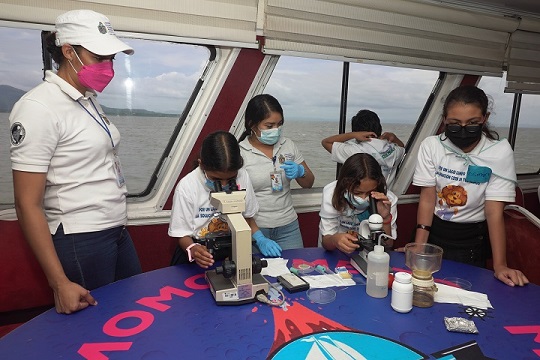
Children observe the microorganisms living in the lake during the environmental project, "The Nicaraguan version of 'Uminoko'"
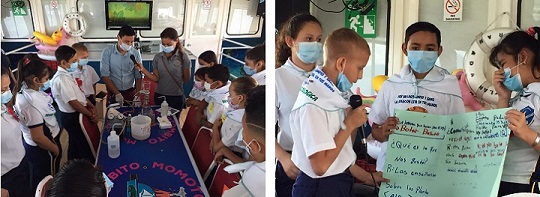
Students present to their classmates the results of the experiments conducted at Uminoko and their reflections on the experience. Rather than being a mere lecture, the program is an activity aimed at arousing the children's curiosity
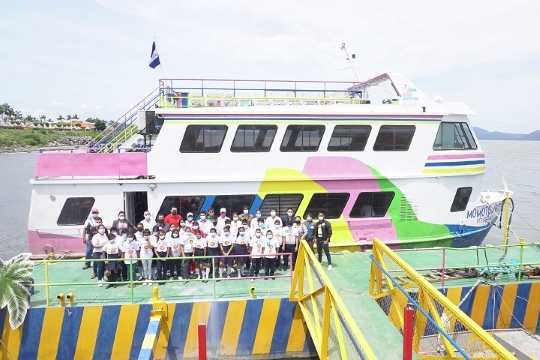
Students pose for a photo in front of Lake Managua and the "Momotombito" where the program was conducted
"Wouldn't it be interesting if one day this dirty and disliked lake would be reborn as a beautiful place for children to bathe and drink from its waters?"
The inspiration for the creation of the BIWAKO Task Force Group came from the words of TAKASAGO Hajime, chief representative of JICA Nicaragua Office.
In response to this question, a team led by Mr. Bonilla began to consider the possibility of improving the lake's water quality and thought, "Isn't there something we can do?" From these very team members, the BIWAKO Task Force Group was born.
"In recent years, efforts have been made to put an end to the contamination of the lake, but it had never occurred to us that the water could even be restored to a level where people could bathe and drink from it," said Mr. Bonilla.
When he read the various documents he got from Mr. Takasago about Lake Biwa, he was motivated to see what could be done. Mr. Bonilla is always highly motivated to take on new challenges. As for his plans for the future, he says:
"In the near future, we hope to send people from different sectors of Nicaragua to Japan. We want them to see for themselves the example of water conservation in Lake Biwa. I am sure they will acquire many new ideas and put these into practice when they return. I believe that saving Lake Managua does not only concern the city of Managua, but also represents a development strategy for the whole country."
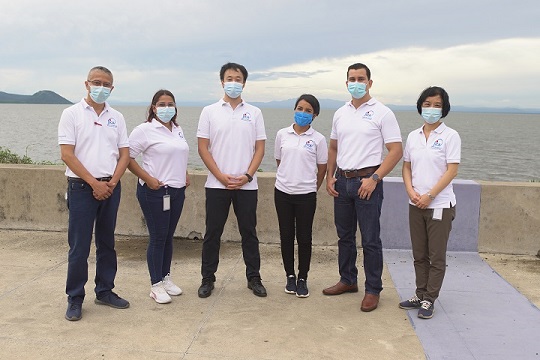
Members of the BIWAKO Task Force Group gather in front of Lake Managua. Leader Omar Bonilla is first on the left
"I hope that the BIWAKO Task Force Group will continue to take on interesting challenges so that we can live in harmony with the lake, which is a unique treasure in Nicaragua. The members of the working group and their Nicaraguan colleagues are thinking of the children who will be the future of Nicaragua. This year marks the 30th anniversary of JICA's cooperation with Nicaragua. As we cherish the relationships we have established over the past 30 years, we will continue to work together with our wonderful colleagues on what is important and necessary for the people of Nicaragua," said Mr. Takasago, speaking of JICA’s new challenges as it continues to put down roots and work in Nicaragua.
scroll